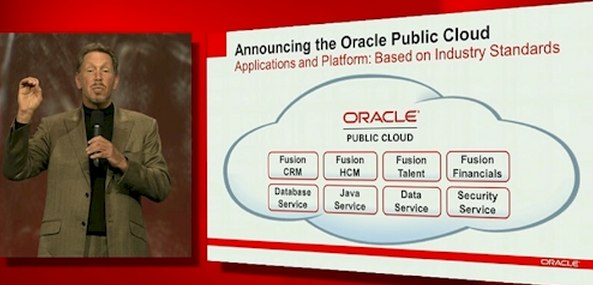Bob Evans has a colorful past. He works at Oracle these days as what I would call a king’s blogger except that he isn’t doing very well even with the apparent influence of the king himself.
Bob used to write for SAP where he penned his own gems about Oracle. The watchmen at Oracle thought Bob did such a good job that they decided to hire him. Now Bob turns on his blog flame against Oracle’s critics.
Bob decided to attack me yesterday in a post he wrote. It’s an odd one about how “TechCrunch is Clueless About The Cloud.” It’s their attempt to rebuke my post last week about how Oracle will be the big loser when IT gets virtualized.
I have been critiquing Oracle for some time about its cloudwashing, the way the company has acted in the open source community and Larry Ellison’s general bombastic antics. The consistent critique from the industry overall has had its effects. Oracle is a company that is trying to distract the market from some considerable flaws in its long-term strategy. The cloud is important for Oracle but only because the company has to make it sound like they actually have something there. They are not seen as a significant player. Yes, it has Fusion, what it calls cloud-based apps. But it is all tied to on-premise and thus the almighty Oracle database.
But there is no real platform as a service environment. There is Java Service, which has not been released yet. The Oracle cloud is not elastic, nor mulit-tenant.
My thought is that Larry Ellison got so pissed off that he ordered Bob to write the post decrying my so called baseless claims. Larry is deeply involved in acquisitions so the post struck a nerve. There are shareholders out there who may have questions like mine.
Bob’s post has all of Larry’s markings. The attacks, the double talk and the rule of opposites that I always apply to Larry. Whatever Larry says, think the opposite. If he says cloud, it is not. If he says open he means closed. And so on.
Bob rants about my baseless remarks, my sloppy work and my audacity for writing such outrageous claims. Whew. What a reflection of Oracle’s insecurities about how it really is threatened by the new movement to distributed infrastructures and open, loosely coupled cloud environments.
Let’s look at the facts: I have talked to several people since Bob wrote his Larryesque post. The consensus is overwhelming that Xsigo is a closed, proprietary technology that Oracle will use to optimize its own stack.
Eric Johnson, CEO of Adara Networks stated to me that it is apparent from Xsigo’s own publicly available information that Xsigo’s NIC does not have any open APIs. Xsigo works off a proprietary driver. You have a switch and a server with the Xsigo device in between. The device is not fully open to be programmed. It is a proprietary device with proprietary I/O that Xsigo is seeking to patent. With this closed environment, Oracle can easily plug it in to its own converged infrastructure.
The point of software defined networking (SDN) is that you have software that can program the hardware, Johnson said, That’s what you can do with OpenFlow, the effort to open software defined networking. Companies that use OpenFlow include IBM, HP and Google.
“There is nothing apparent that allows the core functionality to be programmed externally,” Johnson said.
Xsigo does not fit with open or the principles of SDN.
Bob has a nice quote from Oracle Product Manager Raju Penumatcha. Of course, Raju says there is no truth to my story. It’s funny because he also says that Oracle would tune other company’s products to work well with its own stack.
Of course! But read what he says carefully. Oracle is optimizing Xsigo for its own stack. It is not optimizing for other platforms from Google or IBM for that matter.
Open would be anathema to Oracle. Oracle has proprietary infrastructure, databases and apps. Opening it would mean right sizing its stack to other apps. That would cave in its business model that relies on a closed, proprietary model.
It’s also why the cloud is really not what Oracle is selling. The cloud is about being modular and interoperable. OpenStack lets any hypervisor run on any set of machines. That does not fit with the Oracle way of doing business.
George Reese, CEO of EnStratus said Oracle is still openly hostile to running anything besides Oracle virtual machines in its environment. For years the company has battled with VMware to keep its virtualization technology off the Oracle stack.
George aid Oracle does not have a story for the way the market is going.
“Oracle’s cash cow is its database engine,” he said. “Everything else is irrelevant.”
Bob says Oracle runs on Amazon Web Services. He writes:
Oracle has committed very publicly to offering best of breed open products that allow customers to integrate at any layer of their cloud deployment: PaaS, IaaS, and SaaS, says Penumatcha. This open-cloud policy applies for both public and private clouds, and Oracle CEO Larry Ellison said Oracle’s cloud products can run on the Amazon cloud as well.
That’s true but it would be stretching it to say that Oracle running on AWS has any value. George says what you can run in AWS is essentially crippled. It is not what customers want. They want the Oracle stack in the cloud but that’s not available.
Oracle put the “cloud” name on its products. But that’s just cloudwashing. Now if Oracle came out in support of OpenStack that would be another matter.
Oracle makes its money selling enterprise licenses. In the future, enterprise shops will use a variety of different database environments such as Riak, Cassandra and Mongo DB.
Bob also brings up IBM. Here’s the difference between the two companies. IBM has a legacy product portfolio but its behavior is entirely different. IBM is associated with the Linux movement. Oracle has been a terrible steward of Java and MySQL. Reese makes that point and it is what you hear often in the open source community.
I contacted an Oracle spokesperson for comment but have not yet heard back.
I could go on and on. But I’d like to end with saying that I am honored the king’s blogger took the time to attack me.
For me, it shows I am doing something right.

